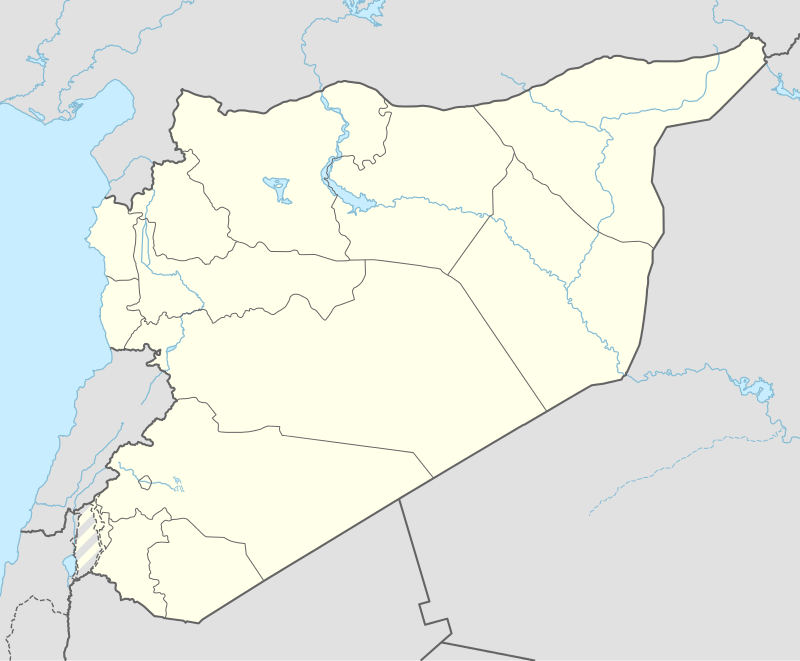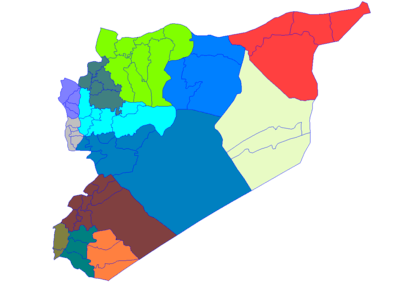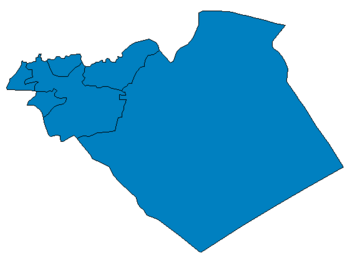Talkalakh
| Tel Kalah[1] تلكلخ Talkalakh | |
|---|---|
| Tell Kalakh | |
 Tel Kalah[1] Location in Syria | |
| Coordinates: 34°40′38.16″N 36°15′01.46″E / 34.6772667°N 36.2504056°E | |
| Country |
|
| Governorate | Homs |
| District | Talkalakh |
| Subdistrict | Talkalakh |
| Elevation | 265 m (869 ft) |
| Population (2004) | |
| • Total | 18,412 |
| Time zone | UTC+2 (EET) |
| • Summer (DST) | +3 |
Talkalakh or Tel Kalah (Arabic: تلكلخ) is a city in western Syria administratively belonging to the Homs Governorate as the capital of the Talkalakh District just north of the border with Lebanon and west of Homs. According to the Central Bureau of Statistics (CBS) Talkalakh had a population of 18,412 in 2004.[2] Its inhabitants are predominantly Sunni Muslims, while the surrounding villages are mostly inhabited by Alawites. Most of the city's Turkmen residents have fled as a result of the ongoing Syrian civil war.[1][3]
People in the city depend on trade and public services as the main source of income. It has six mosques and two main small squares: Al Hurria and Al Saha Al Amma Squares.
History
During the Ottoman era, between the 18th and 19th centuries, Talkalakh was home to the wealthy and influential Danadisha (also spelled Dandashi) clan.[4] They stiffly competed with Hammadi family and the al-Jundi family of Homs and Hama.[5]
Syrian civil war
On May 15, 2011, as a part of the Syrian civil war, the Syrian Army shelled Talkalakh in response to attacks on the army that occurred a day before in the city. Seven civilians were killed and at least 2,000 residents tried to flee from the city into Lebanon.[6]
A resident claimed that Shabiha militias were targeting the Sunni inhabitants, assuring that "The city of Talkalakh is empty of people. Most of them have fled to Lebanon,".[7] The remainder of its Sunni residents continued protesting against the government and attacking nearby Alawite neighbourhoods in the city, as to show their anger against the rule of Bashar al-Assad and his Alawite-dominated government, and their determination to topple the Alawite-dominated government.[8]
On 12 February 2013, a CNN report from inside Talkalakh revealed that the town itself was under rebel control, though government forces were only a matter of yards away, surrounding the town. Nevertheless, there was no fighting in or around the town thanks to a tenuous ceasefire between the warring sides brokered by a local sheikh and an Alawite member of parliament.[9] The ceasefire ended in June 2013, when government forces drove out the rebels and took control of the town.[10]
References
- 1 2 3 4 5 Günümüzde Suriye Türkmenleri. — Suriye’de Değişimin Ortaya Çıkardığı Toplum: Suriye Türkmenleri, p. 15 ORSAM Rapor № 83. ORSAM – Ortadoğu Türkmenleri Programı Rapor № 14. Ankara — November 2011, 33 pages.
- ↑ General Census of Population and Housing 2004. Syria Central Bureau of Statistics (CBS). Homs Governorate. (in Arabic)
- ↑ "Syrians flee "catastrophic" border town". Associated Press. CBS News. 2011-05-16. Retrieved 2015-08-30.
- ↑ Douwes, 2000, p. 113.
- ↑ Douwes, 2000, p. 84.
- ↑ Wikstrom, Cajsa (September 3, 2011). "Escaping Syria's crackdown". Al Jazeera. Retrieved August 17, 2012.
- ↑ "'Catastrophic' picture emerges of Syrian town". U-T San Diego. May 16, 2011. Retrieved August 17, 2012.
- ↑ "Fleeing Violence, Syrians Cross Border Into Lebanon". Georgia Public Broadcasting (GPB). May 4, 2011. Retrieved August 17, 2012.
- ↑ COCKBURN, PATRICK. "Tal Kalakh: Syria's rebel town that forged its own peace deal". Talkalakh: The Independent. Retrieved 13 February 2013.
- ↑ Dominic Evans; Oliver Holmes (26 June 2013). "Syria death toll tops 100,000, rebels lose border town". Reuters.
Bibliography
- Douwes, Dick (2000). The Ottomans in Syria: a history of justice and oppression. I.B. Tauris. ISBN 1860640311.

